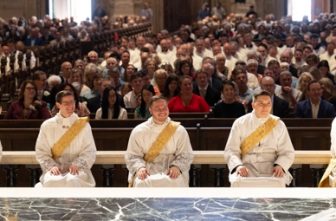
Zach Czaia, 40, is a poet and an English teacher at Cristo Rey Jesuit High School in Minneapolis. He has published two collections of poetry, including “Knucklehead,” and recently launched a poetry podcast called “Open Your Hands.” He and his wife, Cristina, belong to St. Matthew in St. Paul’s west side. They are due with their firstborn next month.
Q) How do you spark a love of literature in your students?
A) With teenagers, you can’t fake anything. If I don’t really care about something, then they’re not going to care about it. One of the ways I spark it is getting students to write their own poetry. I think too often in English classes, teachers will have students read the masters and analyze and dissect, but that doesn’t mean you develop a love for poetry. It just means you know what the teacher thought was exemplary.
Students read their own work to each other. That really helps, for kids to feel like they’re part of it: I can read literature and I can write it, too.
Q) Tell me about their poetry.
A) I am surprised and delighted by what they write. A lot of beautiful portraits of loved ones — some of the most moving things I’ve read. Cristo Rey students are very socially engaged, so there’s also some really powerful poetry that engages issues of social justice. It excites me when students realize: I have a voice! My voice matters in this world!
Q) What have you learned about creativity?
A) Creativity requires play. If you’re going to be creative, you have to be free. You can’t worry about making mistakes.
The idea of creative types as being totally original, that only they can come up with this thing, is a myth. For me, creativity is a dialogue. I get inspired by reading and listening to others. A lot of my work is in dialogue with them. I think that’s true of many artists. Artistic expressions happen in community.
Play and community — I feel like they’re at the heart of creativity. If you allow yourself space to play — in whatever medium you’re interested in — and if you allow yourself to be interested in other artists you admire — then the sky is the limit. You’re going to make stuff, and it’s going to be fun.
Q) Is it hard to guard your creative time?
A) I’m an Enneagram Type 9 — the peacemaker. One of the things a peacemaker struggles with is saying no, especially because a peacemaker wants the people that they’re in community with to always get along. That’s my biggest fear, to upset someone or rupture a relationship. So, if I’m not at my best, I’ll say yes to things that I don’t want to do.
When I’m really aware and in touch with myself, I say, “Actually, I don’t want to do that.” I find myself saying that more, as Cristina is about to have a baby. I say, “We just don’t have the bandwidth.”
Q) What helps a “no” land more softly?
A) Naming the joy that I have in relationship with someone, naming gratitude for whoever the person is reaching out to me. That’s the reason I would usually say yes, because I’m afraid of losing the relationship. “I really appreciate you.” That’s what I usually try to do. Then be honest. People value authenticity.
Q) Your writing has a vivid sense of place. Describe your home.
A) St. Paul is sleepy and mysterious, as my mentor Deborah Keenan says. It’s quiet and there’s so much history. We’re right on the west side, right near Cherokee Park, where you can see across the Mississippi. You can see the Cathedral and the Capitol.
We’ve lived here a year and a half. It’s a two-story house built in 1890. A set of Irish brothers built our house and the house right next to ours when their families were still in Ireland. The story I’ve heard is that, sadly, someone died on the way over, and then the mother died here. There are two gravestones in our backyard: the wife and the child. The bodies were exhumed in the early 20th century.
We can see them from our kitchen. It’s a lovely aspect of this property. I appreciate it.
Q) Are the gravestones reminders, in a way?
A) They make me more aware of the preciousness and transience of life. We’re going to have gravestones, too. I want to try to do some good and be loving and kind.
You realize you’re part of a bigger story than just your own concerns and worries.
What’s cool about the west side is there are a lot of people who have been here for a long, long time. When we started going to St. Matt’s, we mentioned our address and a parishioner said, “Oh, you live in the Bovaird residence! I’ve been in your house!”
I love that intimacy. We’re privileged to get to be part of the next chapter.
Q) Do you do a lot of self-promotion when a book is published?
A) I’m a hustler. I want people to read my stuff. When I got review copies, I was sending them all over. I sent a copy to Stephen Colbert! “Read my stuff, you’re Catholic!”
Every writer has a little bit of an ego. If you think other people should read your work, why not take the time to figure out how to do that?
Q) What compels you to share your poetry?
A) Poetry slows you down. It makes you pay more attention to the world around you, to other people, to yourself. Good poetry makes you more aware. A poem is not written like any other kind of writing. It’s not to get information. Read and savor and slow down and just enjoy the image or maybe be provoked. They want you to consider and reconsider and look at it again.
I think I’m by nature a slow mover. I like taking my time. That’s something I like to encourage, with this podcast and with my students: “It’s OK to slow down. It’s OK to take your time.”
Q) How does your love of Catholicism relate to your love of poetry?
A) Those are intimately connected. Prayer is really important to me. The older I get, the more I realize: None of us are alone, we’re all interrelated, so all the words we say and the actions we do really matter, and that would include words that we really sweat over and spend time editing and revising. I want to make sure I’m a responsible caretaker of words.
Q) How can one live with a poetic heart?
A) Awe and wonder. That’s at the heart of poetry. For me, poetry makes things new. It makes you look at things in a new light. And a lot of times, children help us do that. Living with a poetic heart could mean having a childlike wonder.
Q) What do you know for sure?
A) Love is real. It’s worth fighting for. It’s worth working for. Life is all about connecting and loving. I know for sure it’s real.




